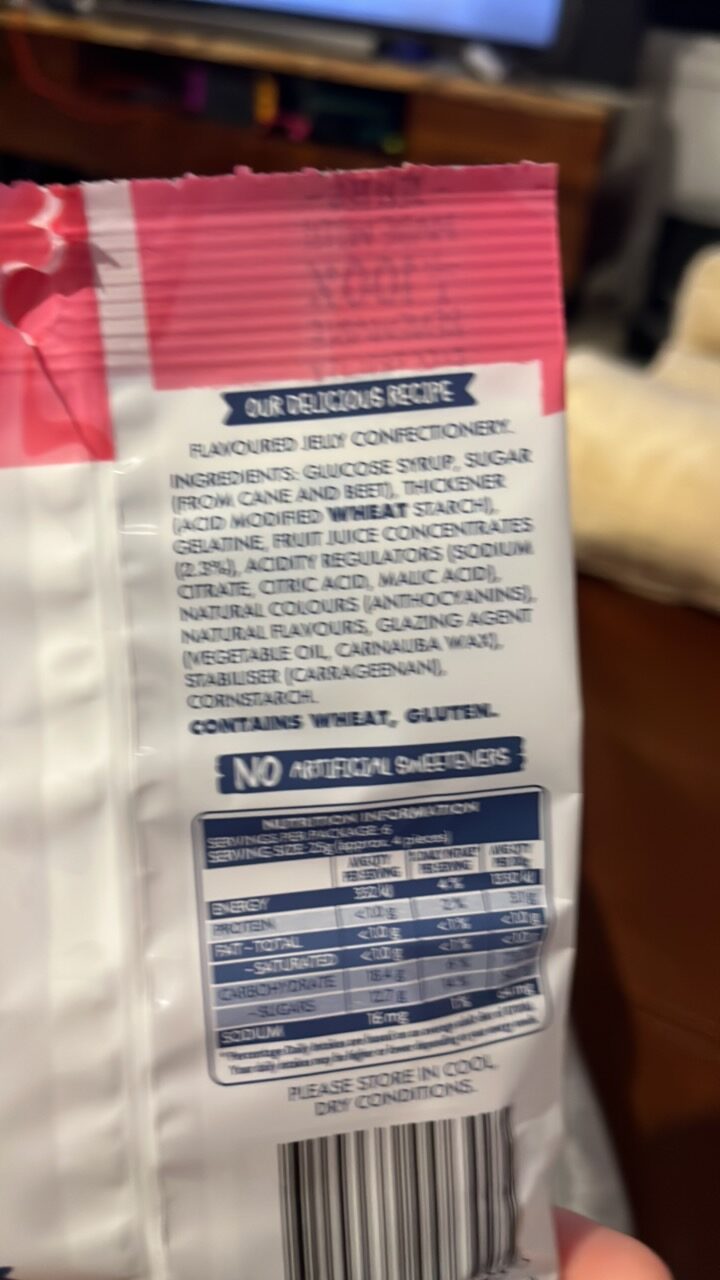
Barcode: 9310434006495
Flavored Jelly Confectionery
DOUBTFUL
📝 Reason: This product contains ingredients requiring further verification. Their Halal status depends on undisclosed processing details and source materials that need clarification.
📄 Certificates: Our Delicious Recipe, Contains Wheat, Gluten., No Artificial Sweeteners, Please Store In Cool Dry Conditions.
Ingredients:
Details
Understanding the Halal Status of Flavored Jelly Confectionery
Flavored Jelly Confectionery is a popular treat enjoyed by many, but if you’re a Muslim consumer, understanding its Halal status is crucial. This confectionery’s Halal status is doubtful, primarily due to certain ingredients that require further scrutiny.
Overview of Ingredients
This product contains numerous ingredients, each with an implication regarding its Halal status:
- Glucose syrup: Permissible in Islam.
- Sugar: Permissible in Islam.
- Thickener: Permissible in Islam.
- Modified wheat starch: Permissible in Islam.
- Gelatin (E441): Doubtful. Check for a Halal logo as this ingredient can be derived from non-Halal sources.
- Fruit juice concentrates: Permissible in Islam.
- Acidity regulators: Permissible in Islam.
- Sodium citrate: Permissible in Islam.
- Citric acid (E330): Generally recognized as permissible, but always check the source.
- Malic acid (E296): Permissible as it is typically derived from natural sources.
- Natural colors: These typically vary; therefore, clarification is advisable.
- Anthocyanins (E163): Generally permissible; derived from plants.
- Natural flavors: Usually acceptable, but further details on their origin are ideal.
- Glazing agent: Permissible in Islam.
- Vegetable oil: Always permissible; derived from plant sources.
- Carnauba wax (E903): Permissible; used primarily as a coating agent.
- Stabilizer: Permissible in Islam.
- Carrageenan (E407): Doubtful; sourced from seaweed but must be verified for processing conditions.
- Cornstarch: Permissible in Islam.
Why the Doubtful Status?
The main reason behind the doubtful Halal status of Flavored Jelly Confectionery lies with ingredients such as gelatin and carrageenan. While many ingredients in this confectionery are permissible under Halal dietary laws, gelatin can sometimes be derived from non-Halal animals (e.g., pigs), and carrageenan’s Halal status can vary based on the source and processing facilities. As these details are generally undisclosed, they pose a challenge for ensuring Halal compliance.
Researching Brand and Certification
When considering whether to purchase Flavored Jelly Confectionery, it’s important to investigate the brand’s adherence to Halal guidelines. Brands that are transparent about their sourcing and are backed with Halal certification tend to inspire more confidence in consumers. Regrettably, this specific product lacks detailed brand information and any certification, which raises the importance of diligence when selecting your snacks.
Consumer Guidance
If you still wish to enjoy Flavored Jelly Confectionery, consider reaching out to the manufacturer or checking their website for any available Halal certification and detailed ingredient sourcing. Additionally, supervising your purchases based on the origins of the gelatin and carrageenan might offer you peace of mind.
Conclusion
In conclusion, while many ingredients in Flavored Jelly Confectionery are Halal, critical components like gelatin and carrageenan need to be verified for complete assurance before consumption. Engage in further research and consult relevant certifications to determine whether this candy aligns with your dietary preferences.
